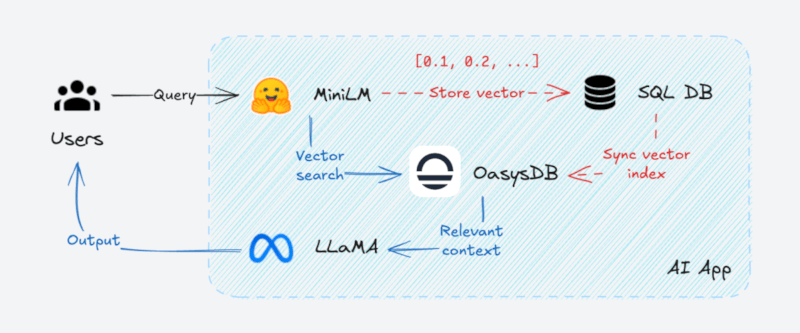18 releases (6 breaking)
| 0.7.3 | Aug 7, 2024 |
|---|---|
| 0.6.1 | Jun 12, 2024 |
| 0.3.0 | Mar 16, 2024 |
#328 in Database interfaces
79 downloads per month
105KB
2K
SLoC

Introducing OasysDB 👋
OasysDB is a hybrid vector database that allows you to utilize relational databases like SQLite and Postgres as a storage engine for your vector data without using them to compute expensive vector operations.
This allows you to consolidate your data into a single database and ensure high data integrity with the ACID properties of traditional databases while also having a fast and isolated vector indexing layer.
For more details about OasysDB, please visit the Documentation.
Quickstart 🚀
Currently, OasysDB is only available for Rust projects as an embedded database. We are still working on implementing RPC APIs to allow you to use OasysDB in any language as a standalone service.
OasysDB has 2 primary components: Database and Index.
-
The Database is responsible for managing the vector indices and connecting the storage engine, the SQL database, to the indices as the data source. OasysDB uses SQLx to handle the SQL database operations.
-
The Index implements a vector indexing algorithm and is responsible for storing and querying vectors. The functionality and algorithm of the index depends on the algorithm we choose when creating the index.
Embedded in Rust
To use OasysDB as an embedded vector database in your Rust project, simply add it to the project Cargo.toml file or run the command below on the terminal:
cargo add oasysdb
When running OasysDB as an embedded database, you have access to both the Database and Index interfaces. In a rare occassion that you're building a project that doesn't utilize SQL, you can use the Index interface directly. Otherwise, the quickstart guide below will show you how to use the Database interface.
// Use the prelude module to import all necessary functionalities.
use oasysdb::prelude::*;
// Open OasysDB database with connection to SQLite.
// Connection is required for new database but optional for existing ones.
let sqlite = "sqlite://sqlite.db";
let db = Database::open("odb_test", Some(sqlite)).unwrap();
// Create a new index with IVFPQ algorithm with default parameters.
let params = ParamsIVFPQ::default();
let algorithm = IndexAlgorithm::IVFPQ(params);
// Setup where the data of the index will come from.
let config = SourceConfig::new("table", "id", "vector");
db.create_index("index", algorithm, config).unwrap();
// Search the index for nearest neighbors of a query vector.
let query = vec![0.0; 128];
let filters = ""; // Optional SQL-like filter for the search.
let results = db.search_index("index", query, 10, filters).unwrap();
More Resources
There are more to OasysDB than what is shown in this Quickstart guide. Please visit OasysDB's Documentation for more information. In addition, if you have any question or need help that needs immediate response, please join our Discord Server and I will try my best to help you as soon as possible.
Contributing 🤝
The easiest way to contribute to this project is to star this project and share it with your friends. This will help us grow the community and make the project more visible to others who might need it.
If you want to go further and contribute your expertise, we will gladly welcome your code contributions. For more information and guidance about this, please see Contributing to OasysDB.
If you have a deep experience in the space but don't have the free time to contribute codes, we also welcome advices, suggestions, or feature requests. We are also looking for advisors to help guide the project direction and roadmap.
If you are interested about the project in any way, please join us on Discord Server. Help us grow the community and make OasysDB better 😁
Disclaimer
This project is still in the early stages of development. We are actively working on improving it and we expect the API and functionality to change. We do not recommend using this in production yet. If you do, however, please let us know so we can help you with any issues you might encounter as promptly as possible.
Dependencies
~14–26MB
~406K SLoC